Publication Year
2020
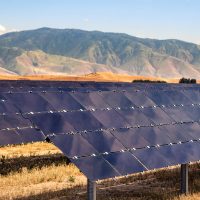
An Alternative LACE Study on Solar PV
December 16, 2020
Renewable generating technologies in the electricity market are often evaluated using the Levelized cost of electricity (LCOE). Using a more holistic approach, this CEEPR Working Paper measures the Levelized Avoided Cost of Electricity (LACE), which considers what it will cost the grid to generate electricity using renewable technology, amortized over its lifetime, to assess the economical value of the renewable generating technology.

Fall 2020 Newsletter Released
December 14, 2020
The next issue of the CEEPR Newsletter is now online. Read about research work and other collected news items from the past few months here.
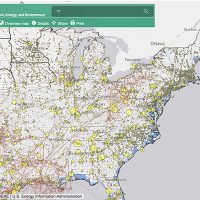
The Roosevelt Project Releases Mapping Tool
December 14, 2020
The Roosevelt Project has created an interactive mapping tool that visualizes the data collected by the research group, down to an individual US county level. You may visit the page here.

Grid Reliability in a Carbon-Constrained World
November 13, 2020
In this upcoming webinar on Nov. 19, organized in collaboration with the MIT Energy Initiative Electric Power Systems Low Carbon Center, two experts on electricity systems and market design will address the impacts of power sector decarbonization on grid reliability.

Trade-offs in Climate Policy: Combining Low-Carbon Standards with Modest Carbon Pricing
November 9, 2020
Past research suggests that choosing between these policies involves trade-offs between the relative efficiency and progressivity of carbon pricing on the one hand and the political acceptability of low-carbon standards on the other. To inform policy choice, this paper explores the effects of different combinations of both policies.

Going Beyond Default Intensities in an EU Carbon Border Adjustment Mechanism
October 19, 2020
As part of its Green Deal, the EU is currently preparing a Carbon Border Adjustment Mechanism (CBAM) that will extend carbon pricing to imports with a view to mitigating carbon leakage concerns. This paper outlines a CBAM design that allows producers to demonstrate that their actual carbon intensity lies below the default value.

The Future of the Energy Workforce
October 14, 2020
Sade Nabahe is a CEEPR Research Assistant working with the Roosevelt Project. Sade shares her experiences interning in Senator Tina Smith’s (D-MN) office as an energy workforce policy fellow.

Reducing Emissions in Transportation: Technology and Policy Options
October 13, 2020
In this upcoming webinar on Oct. 22, two experts on transportation policy and economics, who will draw on recent research work to discuss challenges and opportunities on the path towards a low-carbon transportation sector.

A price on carbon would benefit competitive power markets
October 2, 2020
As federal debate heats up, a Washington Times op-ed co-authored by CEEPR’s Michael Mehling discusses the rationale of carbon pricing in the electricity sector.
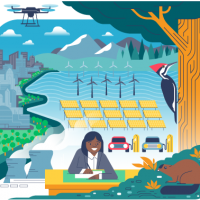
Revamped MIT Climate Portal aims to inform and empower the public
October 1, 2020
MIT today announced a dramatic overhaul of the MIT Climate Portal, climate.mit.edu, which provides timely, science-based information about the causes and consequences of climate change.

Distributional Effects of Net Metering Policies and Residential Solar + Storage Adoption
October 1, 2020
By using a dataset of 100,000 customers’ half-hourly load data and income quintiles from Chicago, IL, the authors of this Working Paper simulate the operation of residential solar and behind-the-meter battery systems under 20%, 45% and 70% adoption levels and calculate both resulting bills as well as cost-shifts for every client.

Towards Carbon Neutrality in Energy and Transportation: The Role of Hydrogen
September 25, 2020
In this upcoming webinar on Oct. 8, organized in collaboration with the MIT Energy Initiative Electric Power Systems Low Carbon Center, three experts will weigh in on the prospects of hydrogen from different backgrounds and regional contexts.

Quantifying the Distributional Impacts of Rooftop Solar Adoption
September 16, 2020
A new CEEPR Working Paper shows that residential rooftop solar PV adoption under typical electricity tariffs that inefficiently recover residual costs through volumetric charges creates substantial income distributional effects, specifically increasing average expenditures substantially for non-adopters, which tend to be predominantly lower income customers.

Axios features Roosevelt Project rollout webinar
September 11, 2020
In a post on Axios, Amy Harder recaps some highlights from her discussion with MIT’s Ernest Moniz during the Roosevelt Project webinar.

Understanding the Economic and Environmental Impacts of the COVID-19 Pandemic
September 11, 2020
The next webinar in the CEEPR Fall 2020 series takes place on Thursday September 24, and brings together Professor Jing Li and Professor Christopher Knittel – the authors of two CEEPR working papers evaluating impacts of the COVID-19 pandemic through use of empirical data.

The Roosevelt Project Working Papers Now Available
September 10, 2020
The first nine Working Papers have been released under the Roosevelt Project, an initiative examining the transitional challenges associated with progress toward a deeply decarbonized U.S. economy. Please click here to access the series page.

Launch Webinar: The Roosevelt Project
August 21, 2020
In this webinar, Professor Ernest Moniz will be joined by a group of high-level experts from academia, public policy and civil society to release nine Working Papers completed during the first phase of the Roosevelt Project. These offer a crosscutting and multidisciplinary assessment of key challenges and opportunities related to the transition. Panelists will present and discuss central messages from this first project phase.

State Ownership and Technology Adoption
August 21, 2020
Many policymakers aim to redirect electric utilities’ power plant investments toward renewables. In much of Europe, state-owned and private utilities co-exist in a liberalized market environment, but the impact of ownership on the adoption of renewables is unclear. By investigating the investments of incumbent utilities in the EU during 2005-2016, the authors study the mechanisms by which ownership made a difference.

2020 Fall Webinar Series
August 11, 2020
This series of webinars will take place from August 27 through December 10 and will cover topics including challenges in electricity markets with high shares of renewables, the economic and environmental impacts of COVID-19, transportation emissions policy, the role of hydrogen in the energy sector, and more. Additional information may be found here as it is updated throughout the Fall semester.

Overcoming Challenges in Electricity Markets with High Shares of VRE: New Research Insights
August 11, 2020
In this upcoming webinar on August 27, the authors of two recent CEEPR Working Papers will describe how bidding formats and pricing models are evolving on both sides of the Atlantic to accommodate the operational constraints of renewable energy and energy storage providers, highlighting a number of lessons learned.

MIT and Wyoming Explore Energy and Climate Solutions
August 4, 2020
Members of Wyoming’s government and public university met with MIT researchers to discuss climate-friendly economic growth.

2020 Fall Webinar Series
July 24, 2020
CEEPR is pleased to announce its Fall 2020 Webinar Series. The series of seven webinars will take place from August 27 through December 10. Additional information may be found here:

A Multi-control Climate Policy Process for a Designated Decision Maker
July 22, 2020
Researchers present an idealized model of optimally-controlled climate change, showing that the four methods of controlling climate damage– mitigation, carbon dioxide removal, adaptation, and solar radiation modification– are not interchangeable, as they enter at different stages of the causal chain that connects GHG emissions to damages.

Abatement Strategies and the Cost of Environmental Regulation
July 17, 2020
Emission standards are one of the primary policy tools used to reduce CO2 emissions in the passenger vehicle market. This Working Paper studies the 2015 introduction of an EU-wide emission standard to understand the effects of emission standards for consumers, firms, and the environment.

Evolving Bidding Formats & Pricing Schemes in US and Europe Day-Ahead Electricity Markets
July 13, 2020
The increasing penetration of renewable energy as well as storage resources requires adapting bidding formats and pricing schemes. Learning from best practices from both sides of the Atlantic, the researchers in this Working Paper review current trends and future challenges to properly evolve these market design elements.

Competitive Energy Storage and the Duck Curve
July 8, 2020
Power systems with high penetrations of solar generation need to replace solar output when it falls rapidly in the late afternoon – the duck curve problem. In this paper, Richard Schmalensee considers investment in generation and storage to minimize expected cost in a model of an electric power system with alternating daytime periods, with solar generation, and nighttime periods, without it.

The Short-run and Long-run Effects of Covid-19 on Energy and the Environment
July 1, 2020
In this commentary, the researchers explore how the short-run effects of Covid-19 in reducing CO2 and local air pollutant emissions can easily be outweighed by the long-run effects of a slowing of the clean energy innovation. A quick stabilization of the economy and expediting investment in clean energy can make all the difference.

Public Transit Use Is Associated With Higher Coronavirus Death Rates
June 29, 2020
An article in the Wall Street Journal discusses findings from a recent CEEPR Working Paper by Christopher Knittel and Bora Ozaltun on COVID-19 death rates.

Electrifying Transportation: Issues and Opportunities
June 25, 2020
In this Working Paper, the researchers examine the global implications of electrifying the transportation fleet. Their analysis covers an array of topics including vehicle cost considerations, infrastructure concerns, emissions consequences, and the potential effect of electrification on gasoline tax revenues.

Researchers see race factor in COVID-19 death toll
June 15, 2020
In this article, Professor Knittel and Bora Ozaltun describe the conclusions from a recent CEEPR Working Paper on Covid-19 death rates.

What Does and Does Not Correlate with COVID-19 Death Rates
June 10, 2020
In this CEEPR Working Paper, Professor Knittel and Bora Ozaltun correlate county-level COVID-19 death rates between April 4, 2020 to May 27, 2020 with key variables using both linear regression and negative binomial mixed models. They include four sets of variables: socio-economic variables, county-level health variables, modes of commuting, and climate and pollution patterns.

What We Know and Don’t Know About Climate Change, and Implications for Policy
June 3, 2020
In a new CEEPR Working Paper, Professor Robert Pindyck explains that we face considerable uncertainty over climate change and its impact, why there is so much uncertainty, and why we will continue to face uncertainty in the near future. He also discusses the policy implications of climate change uncertainty.

The Value of Pumped Hydro Storage for Deep Decarbonization of the Spanish Grid
May 22, 2020
Pumped hydro storage (PHS) is an old solution to a new problem – the variability of renewable generation. A new CEEPR Working Paper presents a case study of Spain, demonstrating how PHS significantly increases the dispatch of low-carbon technologies and lowers emissions.

Welfare Costs of Catastrophes: Lost Consumption and Lost Lives
April 15, 2020
In a new CEEPR Working Paper, the authors, which include CEEPR faculty member Professor Robert Pindyck, discuss the economics of catastrophic events such as climate change and global pandemics.

Energy economics class inspires students to pursue clean energy careers
April 13, 2020
In a feature on MIT News, Professor Jing Li discusses course 15.0201/14.43 – Economics of Energy, Innovation, and Sustainability.

MIT CEEPR Webinars
April 8, 2020
In lieu of the Spring 2020 Workshop, CEEPR Associates will have access to a series of webinars on May 14, 21, and 28. Please check here for further information.

Optimality Conditions and Cost Recovery in Electricity Markets with VRE and Energy Storage
March 17, 2020
In this CEEPR Working Paper, the authors investigate how variable renewable energy and energy storage impacts the formation of prices and optimal investments in electricity markets, using an analytical approach to derive the system-optimal conditions for installed capacity of all generators and storage devices.

Evidence on the Implicit Carbon Price of Energy Efficiency in Buildings
March 2, 2020
Based on data for 548 apartment buildings over 16 years, this paper quantifies the implicit price of carbon associated with more than 400 energy efficiency interventions in 240 treated buildings. The results suggest significant heterogeneity in both energy savings and in the cost of carbon abatement associated with frequently subsidized measures such as windows replacement and wall insulation.

The Key to New York’s Green Dreams May Be Turning Quebec Into a Mega-Battery
February 24, 2020
An article in Bloomberg discusses recent findings from a CEEPR Working Paper on the role of Canadian hydropower for deep decarbonization of the US Northeast.
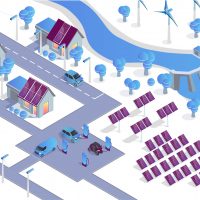
MIT Study Highlights Benefits of a Two-way Exchange of Electricity Between the U.S. Northeast and Quebec as Region Decarbonizes
February 12, 2020
States in the Northeastern U.S. can transition to low-carbon electricity at a lower cost by using hydropower reservoirs in Quebec for energy storage according to a new CEEPR Working Paper.

Supply chain resilience in the era of climate change
February 11, 2020
Climate risk is everywhere — from flood, fire, and wind to migrating labor and depleted raw materials. MIT experts, including Chris Knittel, talk about what to do now to harden your supply chain.

Designing Effective Auctions for Renewable Energy Support
February 5, 2020
Governments use procurement auctions for renewable energy support to stimulate
investment in renewable energy. This Working Paper assesses the effect of prevalent auction design elements on effectiveness, using a unique dataset with results of auctions for renewable energy support from 1990 to 2017.

MIT CEEPR Ranked Among the World’s Top Ten Energy and Resource Policy Think Tanks
February 3, 2020
For the eighth year in a row, MIT CEEPR has been ranked among the top ten energy policy think tanks in the world, according to the annual “Global Go To Think Tank Index Report.”

Study: State-level adoption of renewable energy standards saves money and lives
January 22, 2020
MIT researchers review renewable energy and carbon pricing policies as states consider repealing or relaxing renewable portfolio standards.

Zeroing in on decarbonization
January 15, 2020
To avoid the worst impacts of climate change, the world’s electric energy systems must stop producing carbon by 2050. “My work has shown me that we do have the means to tackle the problem…”
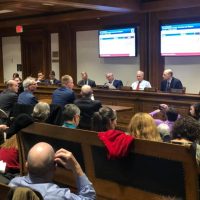
Carbon Price, Competitive Supply, and Consumer Protection
January 15, 2020
On January 14, 2020, Professor Christopher Knittel testified before the Joint Committee on Telecommunications, Utilities, and Energy at the Massachusetts State House. Read his full statement here.
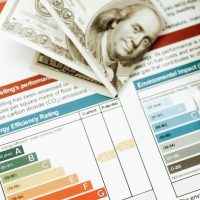
Using Machine Learning to Target Treatment: The Case of Household Energy Use
January 9, 2020
In this Working Paper, the researchers use causal forests to evaluate the heterogeneous treatment effects (TEs) of repeated behavioral nudges towards household energy conservation and find suggestive evidence of a “boomerang effectâ€: households with lower consumption than similar neighbors are the ones with positive TE estimates.




